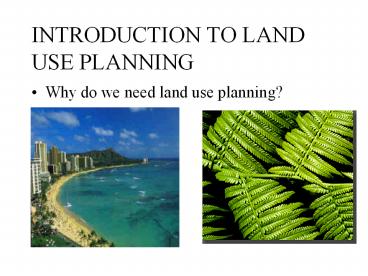INTRODUCTION TO LAND USE PLANNING - PowerPoint PPT Presentation
1 / 20
Title:
INTRODUCTION TO LAND USE PLANNING
Description:
Planning is an ecosystem based tool that can link the environment, the community ... changing fortunes of municipalities (losses and gains in tax revenues ... – PowerPoint PPT presentation
Number of Views:7568
Avg rating:3.0/5.0
Title: INTRODUCTION TO LAND USE PLANNING
1
INTRODUCTION TO LAND USE PLANNING
- Why do we need land use planning?
2
1. Land use planning versus land use controls
- land use planning a definition
- land use controls a definition
3
- land use planning a definition
- Planning is an ecosystem based tool that can link
the environment, the community and the economy in
ways that help ensure the sustainability of
resources. - Planning is expected to integrate environmental,
social and economic values, resolve conflicts,
build common land use objectives, ensure openness
and inclusiveness as well as adapt to global,
national and local needs and preferences
4
- land use controls a definition
- Land use controls are public or private rules
that influence or restrict the use of land to
protect or promote the health, safety, or welfare
of the community. - Public rules laws, ordinances and regulations
imposed by federal, state or local government. - Private rules deed restrictions and covenants
- Influence or restrict the use of land by setting
forth what we can and cannot do with land -
certain rules like tax benefits and subsidies
influence use of land
5
2. Why is there a need for land use planning
- the nature of land
- the nature of land ownership
- the nature of use impacts
6
The nature of land
- Land is all of those resources that are naturally
endowed on top of the ground, beneath it and
the air (vertical space above the ground). - The single resource on which all life depends
- Where portions of land can be privately owned it
is referred to as real estate or real property
that is identifiable by means of boundary markers
which are legally enforced/protected.
7
The nature of land (2)
- Land is also an asset that can be transferred
under guarantees enforced by the legal system of
the state (most western societies have strict
laws that protect the value, ownership and
transferring of land). - - As such, land is the wealth of a nation.
8
The nature of land ownership
- Bundle of sticks (rights and constraints)
- (see handout)
9
Land use associated problems
- 3i) Urban Sprawl
- Gentleman farms
- Ribbon development
- Urban splatter (leap
- frog development)
10
Land Use Impacts Problems and issues
- 3ii) Loss of farmland
- increased need for irrigation
- Increased soil erosion
- Instability in crop production
- Loss of amenity associated
- with cropland (aesthetic value)
- reduction in available prime
- agricultural lands
11
Land use impactsProblems and Issues 3iii)
Fiscal effects of land use change
- local tax increase or decrease
- increased demand for infrastructure and other
amenities (schools, safety services ) - changing fortunes of municipalities (losses and
gains in tax revenues
12
Land Use impacts Problems and issues
- 3 iv) Degradation of the natural environment
- Impacts on air, and water quality
- Excessive water withdrawal
- Energy waste
- Destruction of wildlife habitat
- Visual blight (introduced incongruence emphasis
on what does not fit)
13
Land use impacts Problems and issues
- 3v) Destruction of valued cultural and historical
assets - sense of place
- historically significant
- structures
- other cultural sites
- Kings trail Hawaii Island
14
Land use impacts problems and issues
- 3vi) Developments Concerns for equity and
inclusiveness - Affordable housing for the poor
- sustainability of resources and cultural
diversity - ensuring democracy and citizen participation
15
Land Use discontent and conflict
- Underlying causes
- Ownership
- Uses and their impacts
- Pace of change
16
Land ownership and uses
- OWNERSHIP
- USA Fig 1-1, Page 5 Platt.
- Private 58, Federal 34, State local govt.
6, Indian Tribes 2 - HAWAII Private 62, Federal 8 State local
govt. 30 (includes 5 DHHL) - (see Atlas of Hawaii, p. 225-232)
17
Land Use Categories
- Conventional categories
- Agriculture (cropland)
- Forestland, wetlands, grassland, recreation...
- Urban (lt 10 land area)
- Hawaii Agri 45, Conservation 38, Urban
Rural less than 20 - (See percentages web sources)
18
Land Use Change
- Methods of estimation
- (See sample from web search.)
- See Table 1-1, p. 11, Platt for changes in agri.
land area since 1959.
19
(No Transcript)
20
4. The Land use conflict management system
- the role of government
- private property owners
- public interest groups































